Diving Sites in Port Blair



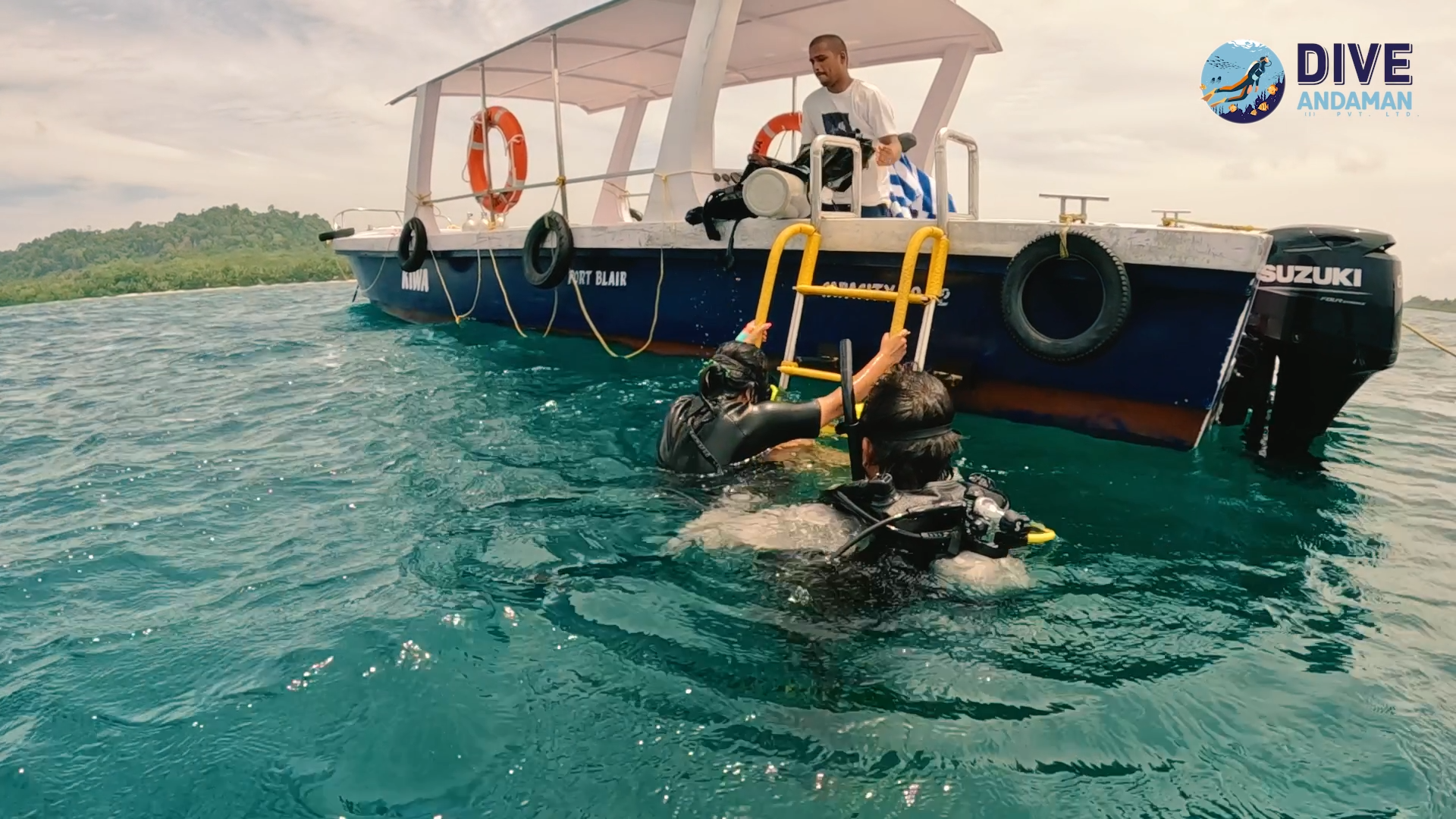
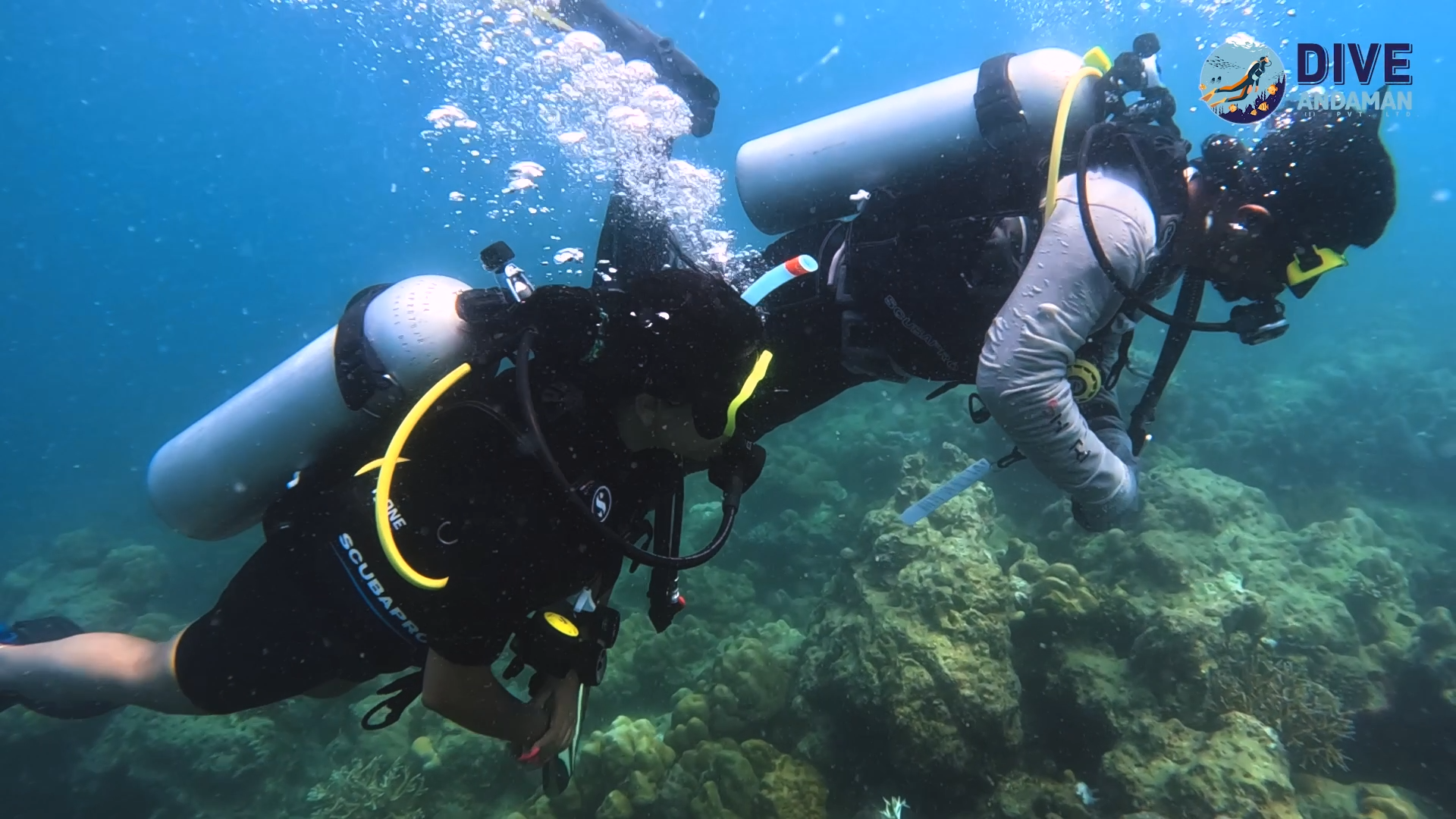
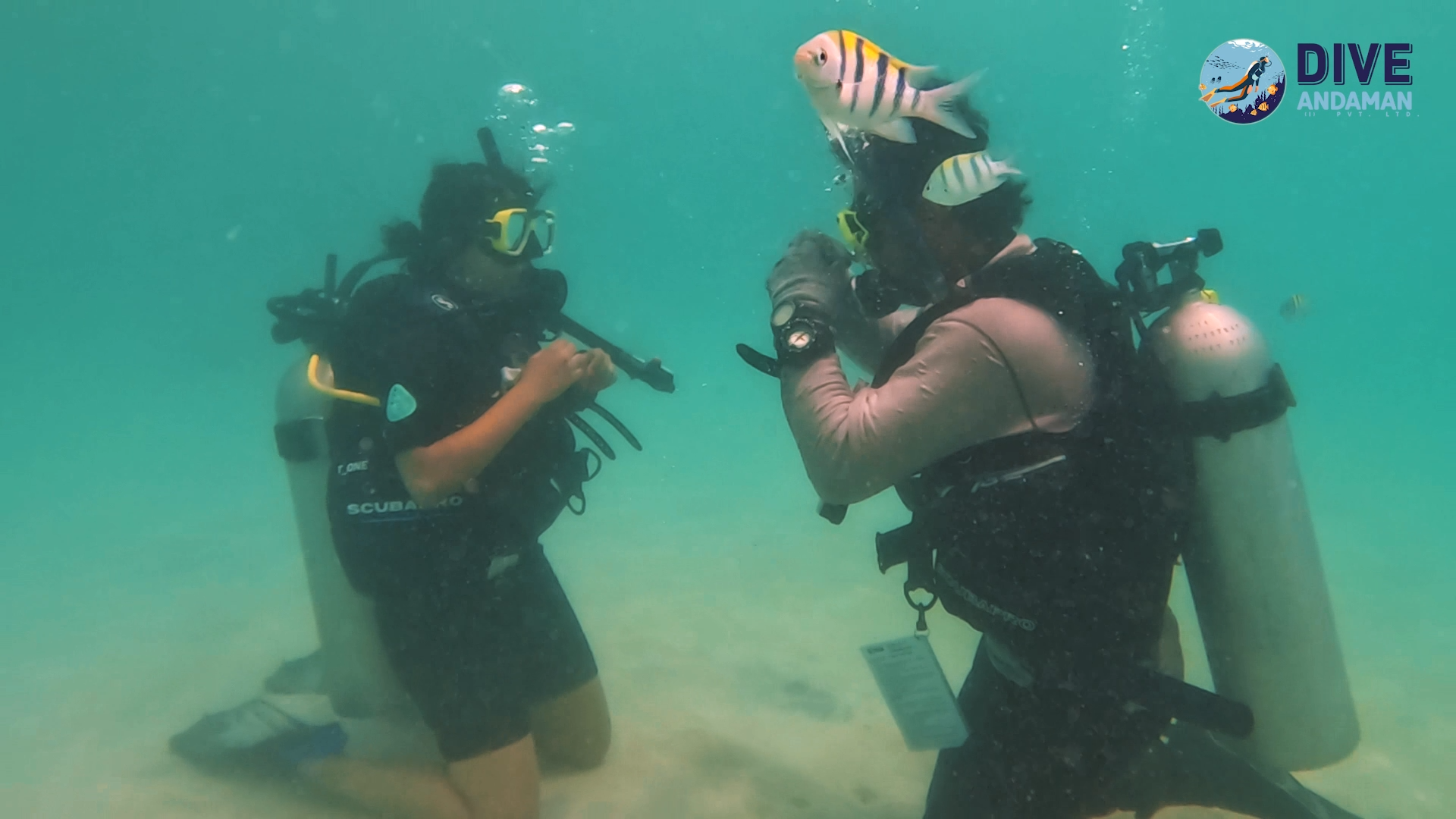
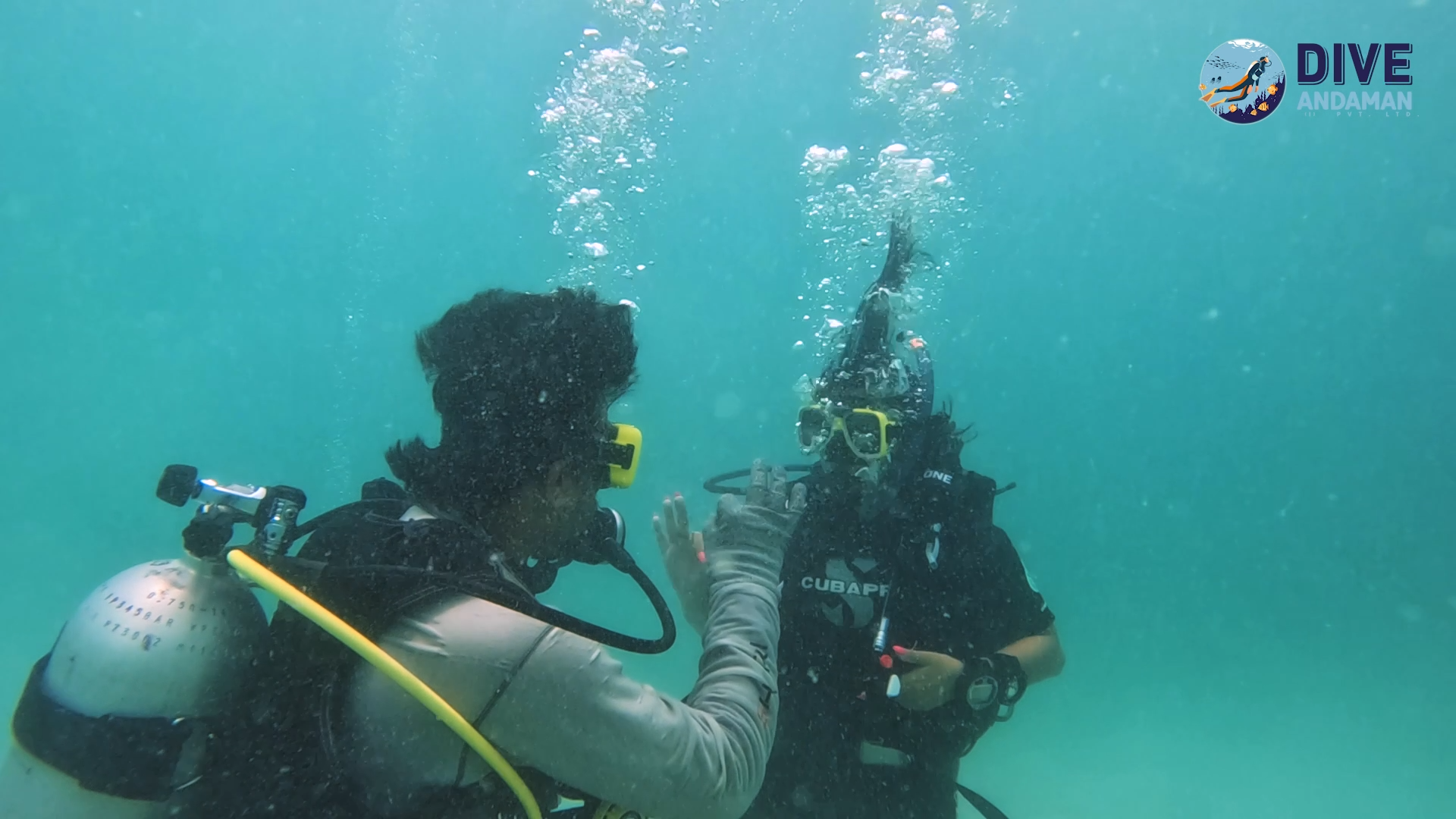
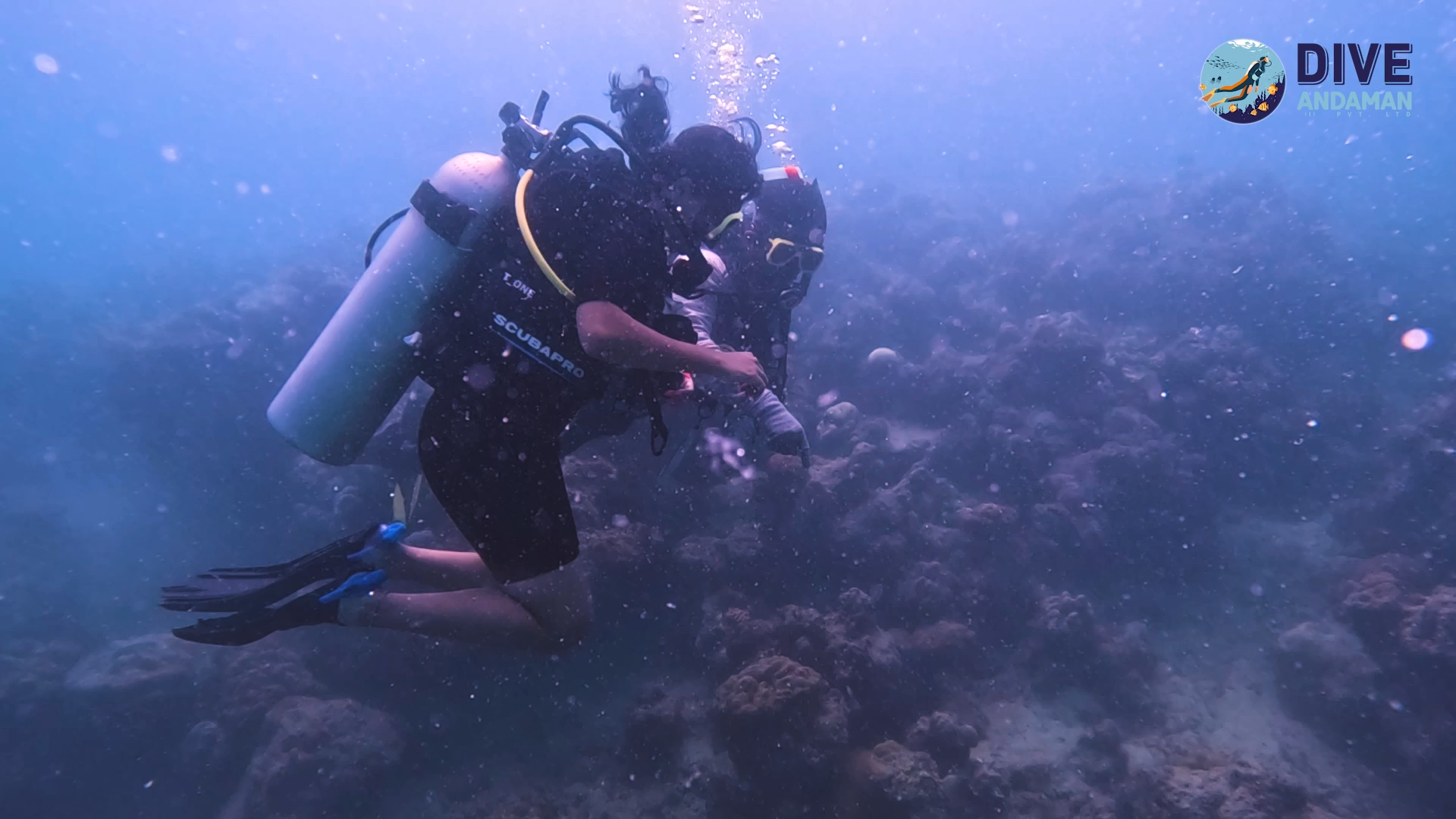
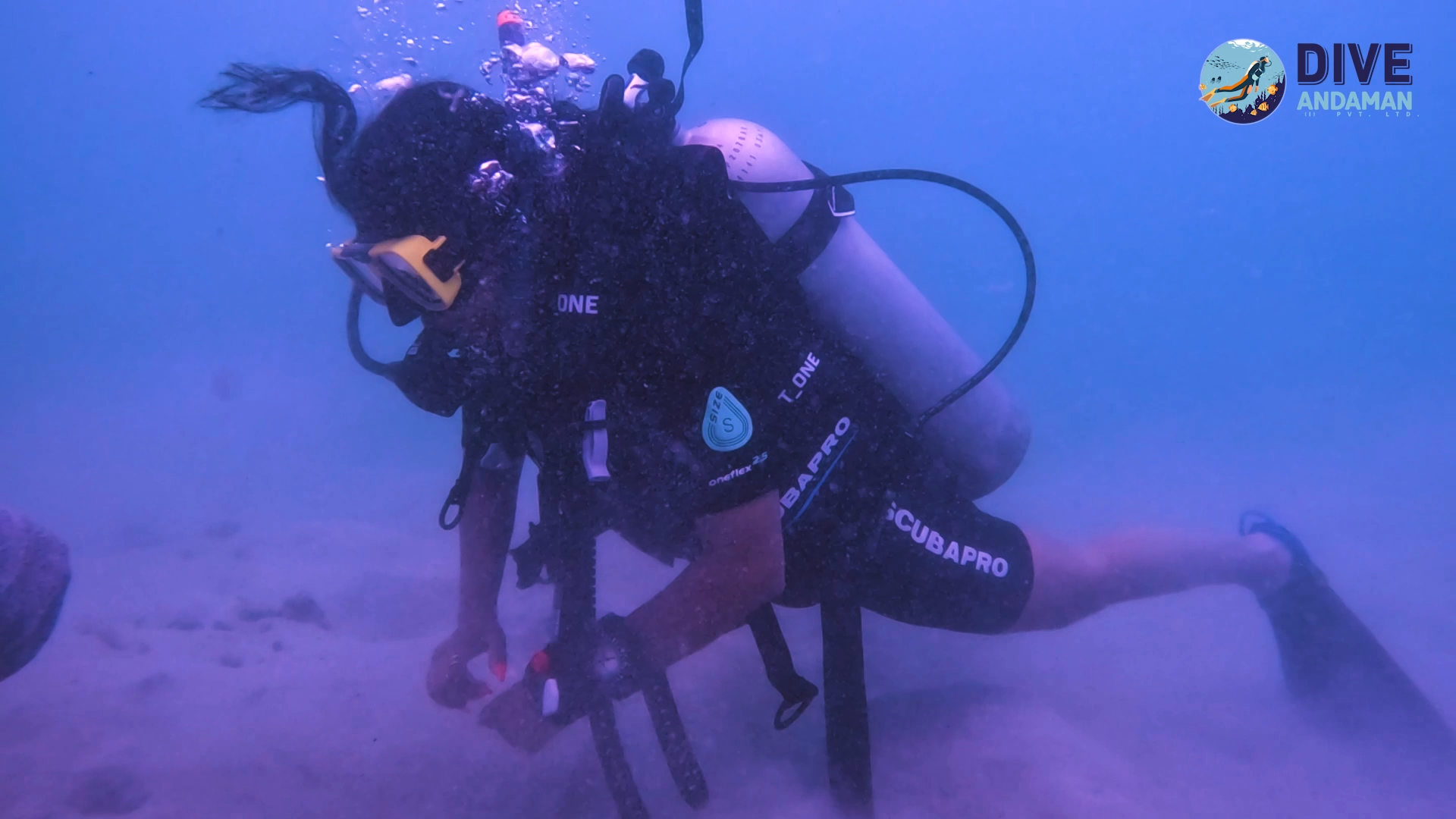
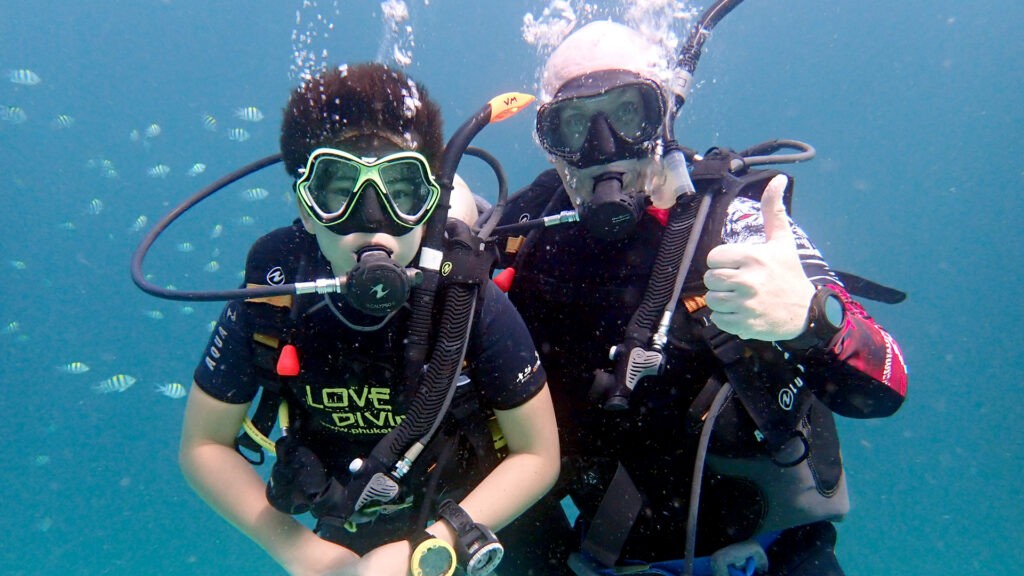
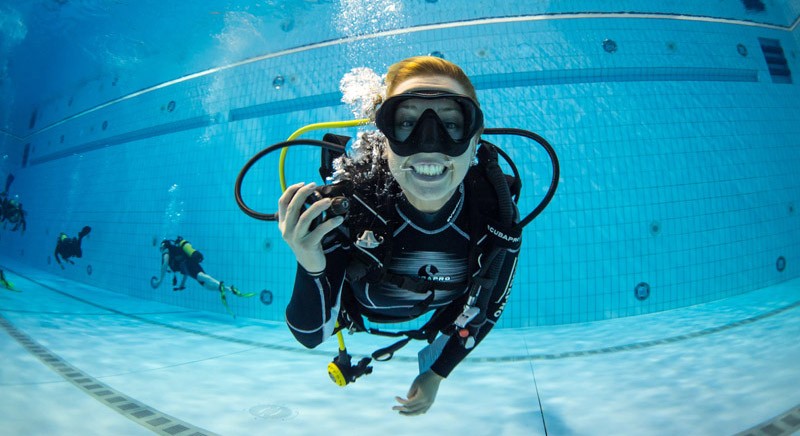
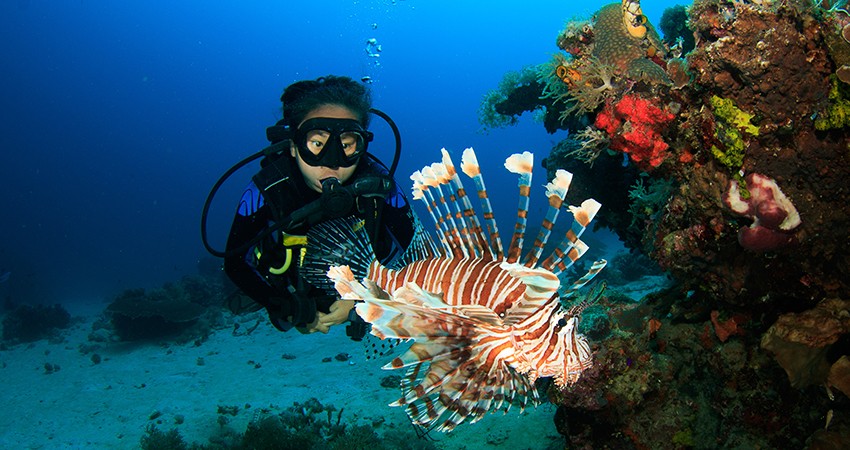
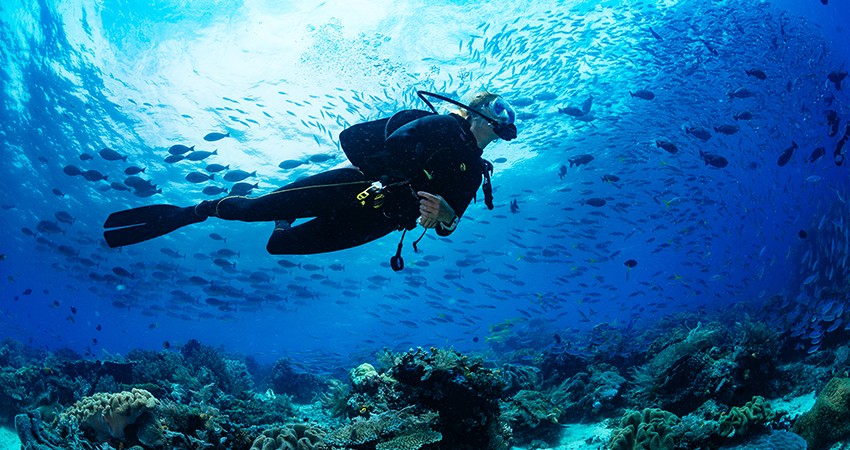










Duration
- Duration: 3-4 Days
- Course Name: Open Water course
- Instructor: In-House PADI Instructors
- Certification: PADI Open Water Diver
In This Course, You Will Learn How To:
- Manage your buoyancy.
- Assemble and use scuba gear.
- Be a confident and skilled diver.
- Respectfully approach marine life.
- Handle common scuba diving problems.
PADI Open Water Diver is the first scuba certification level. A highly-trained PADI Instructor will teach you how to scuba dive in a relaxed, supportive learning environment. By the end of the course, you'll have the skills and knowledge to dive anywhere and be an ambassador for the underwater world.
After This Course, You Will Be Capable Of:
- Supporting Ocean Protection.
- Seeing Things You Have Never Seen Before.
- Exploring The Other 70 Per Cent Of Our Planet.
- Diving With Scuba Diving Experts Across The World.
- Carrying The World’s Most Recognized Scuba Certification.
Earn Your Open Water Course Certification
Step 1- Independent Study
PADI E-learning: PADI eLearning makes it easy to fit scuba lessons into a busy schedule. Learn about scuba diving principles and terminology whenever, wherever it's convenient for you. It's your course on your time. Study offline, or online using a computer or mobile device. Connect with your instructor whenever you have a question.
E-Learning Time Commitment:
- 5-10 hours
- Read 5 sections of Theory
- Complete 5 Knowledge
- Reviews & 4 Quiz Sections
Step 2- Swim / Snorkel & Float Test
As per PADI standards to become an Open Water diver, your instructor will ask you to float or tread water without aids for 10 minutes. Swim 200 meters /yards with no aids OR Snorkel 300 meters /yards with mask, fins and snorkel.
- Prerequisites: Moderate swimming skil Medically fit for Scuba.
- Total Time Commitment: 3-4 days.
- Minimum Age: 12 Years to 60 Years.
- Depth: Maximum 18m/60ft.
Step 3- With Your Instructor
Confined Session: Practice using scuba gear in a pool (or pool- like environment) until you're comfortable. PADI training includes 5 confined water sessions in the pool (or pool-like environment) for skill learning to help you build self confidence.
Step 4- With Your Instructor in Open Water
All the skills that you have learnt in the confined sessions with your instructor will be demonstrated by you in Open Water shore dive 1 & 2 with each dive of upto 45 minutes. Once you have demonstrated all the skills as per the PADI standards you will make Open water boat dive 3 & 4 where in maximum diving depth will be 18 meters.
Step 5- Final Exam & Certification Processing
The course will end with your final exam as per your e-learning knowledge consisting of 50 questions. Your Instructor will then process your certification.
PADI Open Water Course Details
Course Details | ||
Days | Activities | Details |
| Day 1 | Theory Classes | Theory, video classes with knowledge development exams 1, 2 & 3, self-study, and instructor briefings. |
| Confined Water Training | Shallow water skill training which includes session 1, 2 & 3. | |
| Additional Training | Improve Swimming / Training | |
| Day 2 | Theory Classes | Knowledge development exams 4 & 5. |
| Confined Water Training | Shallow water skill training which includes session 4 & 5. | |
| Swimming Assessment | Followed by swimming test | |
| Additional Training | Swimming / snorkelling training | |
| Day 3 | Shore Dives | Open water shore dive 1 & 2 (each dive up to 45 minutes). |
| Dive Planning | Planning for next day boat dives. Diving depth maximum 12 meters. | |
| Additional Training | Swimming / snorkelling / floating training | |
| Day 4 | Boat Dives | Open water boat dive 3 & 4. |
| Classroom | A small classroom for quick review. | |
| Final Steps | Final exams & certification processing. Diving depth maximum 18 meters. | |
By the end of the PADI OPEN WATER DIVER COURSE day 4 you are a certified PADI open water diver and will get a temporary card on E-mail and can dive around the globe to maximum 18 meters with a certified diver along as a buddy. You can access your permanent open water diver card using PADI mobile application or you can order a recycled plastic Diving Card in PADI application.
Top Dive Sites for Your PADI Open Water Diver Course in Andaman
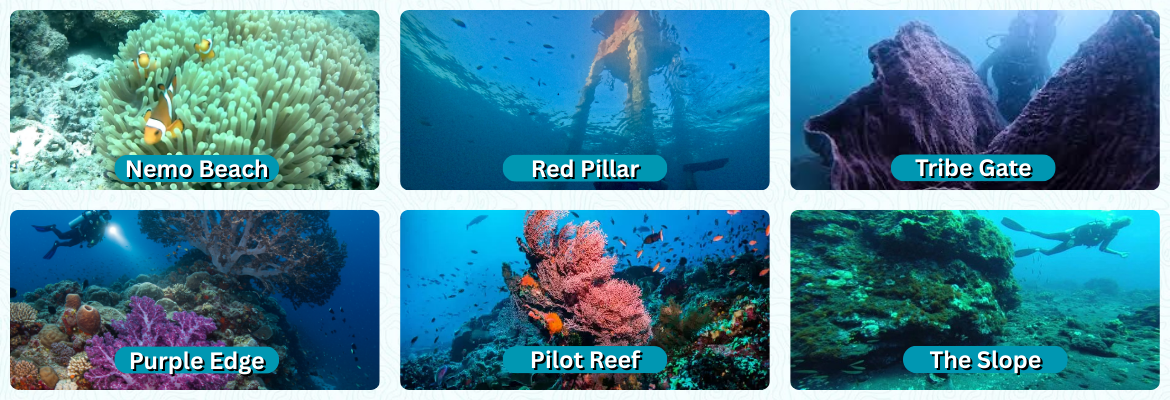
Course Fee, Photography & Videography Charges
Course Fee Structure | |||
Course Name | Duration | Description | Cost (INR) |
| PADI Open Water Diver Course | Approximately 4 days | Learn the skills & complete the dive course | Rs. 35,000 + 18% GST |
Photography & Videography Charges | |||
Service | Deliverables | Additional Cost | Inclusions |
| Underwater Videography & Photography | Complete storyline with daily video shoots for social media use | Cost for this video shoot will be Rs.10,000/- extra apart from the dive course cost. | Daily video shoot (on-ground & underwater). All raw footages daily. 1 edited 90-second reel. 1 full edited dive course video. |
Itinerary:
Day-Wise Itinerary | ||||
Days | Morning | Afternoon | Evening | Accommodation |
| Day 1 | Arrive at Port Blair, meet representative | Ferry to Havelock (MAKRUZZ / NAUTIKA), hotel check-in | THEORY TEST at Dive Centre | Havelock Island Beach Resort |
| Day 2 | Breakfast | CONFINED WATER DIVING TRAINING | Leisure/Rest | Havelock Island Beach Resort |
| Day 3 | Breakfast | 2 SHORE DIVING TRAINING | Leisure/Rest | Havelock Island Beach Resort |
| Day 4 | Breakfast | 2 BOAT DIVING TRAINING | Leisure/Rest | Havelock Island Beach Resort |
| Day 5 | Breakfast | Ferry to Port Blair, transfer to airport | Departure | - |
Accommodation:
Cost Breakup As Per Hotel Used | ||||||
Stay Details | Room Category | No. of Nights | No. of Adults | Meal Plan | Room Cost Calculation | Total with GST (12%) |
| Havelock Island Beach Resort | 01 AC Deluxe Cottage (Garden Facing) | 04 Nights | 02 can stay in the same room | Breakfast | Rs. 7000 × 4 Nights × 1 Room = Rs. 28,000 | Rs. 31,360/- |
Ferry Transfer Charges:
Cost of Cab, Ferry Ticket & Entry (Actual Cost with No Hidden Charges) | |||
Component | Rate | Qty | Amount (INR) |
| AC Cab for Airport Pickup, Ferry Transfers & Resort Transfers | Rs. 2,000 (Flat rate) | 1 | Rs. 2,000 |
| Ferry: Port Blair to Havelock Island (Premium Class - Makruzz/Nautika) | Rs. 1,750 | 1 Person | Rs. 1,750 |
| Ferry: Havelock Island to Port Blair (Premium Class - Makruzz/Nautika) | Rs. 1,750 | 1 | Rs. 1,750 |
| Amount | Subtotal: Rs. 5,500 | GST @ 5%: Rs. 275 | Total: Rs. 5,775/- |
Total Payable Amount (Accommodation + Ferry Charges): Rs.31,360 + Rs.5,775 = Rs.37,135
Package Inclusions & Exclusions | |
Inclusions | Exclusions |
| Accommodation for 4 nights at Havelock Island Beach Resort as per selected room category. | Accommodation in Port Blair (can be arranged at extra cost). |
| All transfers by private AC car at Port Blair & Havelock Island for Airport & Ferry transfers. | Sightseeing in Havelock Island (available at extra cost). |
| Ferry Tickets from Port Blair to Havelock Island (Premium class - Makruzz/Nautika). | Any extra excursions not mentioned in the suggested itinerary (extra cost). |
| All applicable taxes are included. | Water sports activities not included in the itinerary (available at extra cost). |
| Airfare / Ship fare (not included). | |
| Any kind of personal expenses (extra cost). | |
| Expenses incurred due to bad weather, natural calamity / flight or ferry cancellation, strike or any—to be borne by the guests. | |
| Political unrest—has to be paid by the guest as per actual. | |
Get in Touch with Our Professionals Dive Instructor
Medical Requirements
A minimum level of health and fitness is required for scuba diving. In case you are suffering from any chronic health condition, or taking certain medications and/or had surgery recently, you will have to get written approval from a physician before diving. In order to avoid any confusion, you can simply download and review the Diver Medical Form to make sure that you will not require approval from a physician to dive. You should not ask your instructor, dive master, or dive shop staff for medical advice as they are not physicians. Only medical professionals can give medical clearance to dive if you do not have a minimum level of health and fitness.
Why You Should Take PADI Open Water Diver Course in Andaman?
If you are always ready for an adventure and excited to explore what our wonderful planet has to offer, then scuba diving sounds like a perfect activity for you. While discovering the incredible marine life, you will challenge yourself at so many levels you wouldn’t have even imagined- both physically and mentally. Your underwater experience will boost all your senses and open your eyes to a whole new magical world! That’s why, we would suggest you to get yourself scuba dive certification and go for your first dive as soon as you can.
If you are still doubtful whether this is something for which you should spend your time, efforts, and money, then we present here five reasons why you should take that leap of faith in your next voyage.
1 Take your Beach holiday to a New Level
If you are already on a beach holiday, then scuba diving can add some extra adventure to your vacation. You can discover new underwater sceneries, species, and maybe even wrecks. Whether you are travelling alone, with a partner or entire family, scuba diving is something that most people would agree to do. This adventurous activity stands out from the rest owing to the magic and ecstasy it offers to the divers throughout.
2 It’s a whole new world Out there
Just dive under the waves and in no time, you will be transported to a miraculous colourful world. Scuba diving is an extremely peaceful experience wherever you are doing it- tropical coral reef or in a cenote. Forget the law of gravity here! You can move freely in all directions without any limitations. For those who want to experience something close to flying, scuba diving is what you should be doing.
3 More Exciting Travel Plans
You will start to plan your vacations in a completely different way once you have discovered the amazing feeling of diving. You will begin searching for new adventurous places to dive. You may even get engaged in creating your own scuba bucket list. When you start spending time under the water, you will begin loving and respecting marvellous oceans. As much as 70 per cent of the Earth is covered by oceans. So, if you are willing to see the world, scuba diving lets you see the two-third part, which a tiny number of people dare to explore.
4 Opportunity to Meet Unique Marine Animals
The most diverse of marine ecosystems are coral reefs and that’s why, they are also known as the rainforest of the sea. Of course, you must have seen marine animals captured in an aquarium, but nothing compares to watching them in their own habitat. Imagine looking at dolphins, whales, sharks, manta rays, and turtles among so many other lovely underwater creatures in their home sweet home! That would definitely be a life-changing experience for you.
5 You Get to Explore this Awesome World Even More
This might be the best reason to scuba dive. In order to fulfil your diving desires, you will start making plans to travel to exotic places. It may change your life altogether. Scuba diving is an addiction; it’s like meditation. To fulfil this dream, you will travel to stunning destinations, spend your days at the beach, sometimes on a boat or underwater- all this to share your passion for the underwater world. Your lifestyle will get changed completely as you would be changing destinations every time you want to go on vacation.
Along with being enthralling, scuba diving is also very relaxing as you glide through the water hearing nothing but your breath. This contact with underwater nature will make you learn more about oceans and respect them even more. Your entire mindset will get changed. Your life would be a whole new adventure.
Our planet is 70 percent water, but still, we cannot survive in that medium unassisted for a long time. But with scuba diving, this is absolutely possible. You can spend your time comfortably under the water for extended periods. And thus, you can discover marine life you never knew existed before. Even just knowing that because of engineering advancements, you are able to breathe under the water, makes you appreciate your life so much more. Who thought doing this with ease would be possible someday!
If you have made up your mind to go for your first dive, then Havelock Island (now known as Swaraj Dweep) in Andaman Island has the best diving spots in India. Diving here will take you far away from all the noise, the traffic and the troubles in the world. Descending into the waters will let you hear nothing but your own breathing. No phones ringing and no talking- only hand signals can be used for communicating underwater. When you are in the mysterious blue world, you completely forget what is happening back on land and what keeps you busy. During your diving time, it’s only you and your thoughts. Nothing else is there to distract or trouble you. ‘Underwater’ is the most peaceful place on earth.
Clients Video
Frequently Asked Questions
-
Q. 1 : What does the PADI Open Water Diver course entail?
The PADI Open Water Diver course is a certification course that teaches the basics of scuba diving through a combination of theory and practical training. The course covers skills such as equipment setup, underwater navigation, and buoyancy control. Successful completion of the course allows one to dive to a maximum depth of 18 meters (60 feet) and participate in dive activities with a certified dive companion or dive professional.
-
Q. 2 : What are the prerequisites for the PADI Open Water Diver course?
The PADI Open Water Diver course requires an individual to be at least 10 years old and have basic swimming skills. One must also fill out a medical questionnaire to ensure that they are in good health to participate in scuba diving activities. There are no other prerequisites.
-
Q. 3 : How long does it take to complete the PADI Open Water Diver course?
The PADI Open Water Diver course typically takes three to four days to complete, consisting of classroom and pool sessions, as well as four open water dives to apply the skills learned.
-
Q. 4 : Can the PADI Open Water Diver course be completed online?
Yes, an online version of the PADI Open Water Diver course is available. The online course covers the same material as the classroom-based course and includes interactive quizzes, videos, and other learning resources. Upon completion of the online course, one can attend practical sessions to complete certification.
-
Q. 5 : Is the PADI Open Water Diver course challenging?
While some of the skills may be challenging initially, the PADI Open Water Diver course is designed to be accessible to people of all ages and skill levels. With practice and guidance from an instructor, students can develop the necessary skills and confidence to become certified scuba divers.
-
Q. 6 : What is the difference between the PADI Open Water Diver certification and other scuba diving certifications?
The PADI Open Water Diver certification is the most widely recognized scuba diving certification in the world and is considered an entry-level certification. Other certifications, such as the Advanced Open Water Diver certification, offer more advanced training and allow you to dive to deeper depths and in more challenging conditions.
-
Q. 7 : Is the PADI Open Water Diver certification recognized globally?
Yes, the PADI Open Water Diver certification is recognized internationally, which means that once certified, one can dive with a certified dive buddy or professional anywhere in the world.
-
Q. 8 : How long is the PADI Open Water Diver certification valid?
The PADI Open Water Diver certification does not expire. However, it is recommended to refresh diving skills every 6-12 months to maintain knowledge and confidence.
-
Q. 9 : Can individuals with medical conditions or disabilities take the PADI Open Water Diver course?
Whether individuals with medical conditions or disabilities can take the PADI Open Water Diver course depends on the nature and severity of their condition. They should consult with their physician and the course instructor to determine if adaptations can be made to accommodate them.
-
Q. 10 : Is the PADI Open Water Diver course covered by insurance?
It depends on the insurance policy. Some policies cover scuba diving activities, while others do not. It is advisable to check with the insurance provider to see if the course and related activities are covered. Additionally, many dive centers and instructors may require dive insurance before participating in any dive activities.
-
Q. 11 : What exactly is the PADI Open Water Diver certification?
The PADI Open Water Diver certification is an entry-level scuba diving certification that authorizes you to dive with a certified dive buddy at a maximum depth of 18 meters (60 feet). It is a widely recognized scuba diving certification worldwide and is considered the most popular in the industry.
-
Q. 12 : If you cannot swim, can you enroll in the PADI Open Water Diver course?
No, it is a requirement that you know how to swim to enroll in the PADI Open Water Diver course.
-
Q. 13 : Is scuba diving safe?
Scuba diving can be dangerous if safety protocols are not followed, but if you are trained by a certified instructor and adhere to safety guidelines, it can be a safe and enjoyable activity.
-
Q. 14 : What equipment do you need to take the PADI Open Water Diver course?
Scuba diving equipment such as a mask, fins, snorkel, a buoyancy control device (BCD), regulator, dive computer, and wetsuit are necessary for the PADI Open Water Diver course. Dive centers often provide rental equipment, but some students prefer to purchase their own.
-
Q. 15 : Can you dive alone with the PADI Open Water Diver certification?
No, the PADI Open Water Diver certification only permits you to dive with a certified dive buddy.
-
Q. 16 : Where can you take the PADI Open Water Diver course?
PADI-certified dive centers and resorts worldwide offer the PADI Open Water Diver course. You can use the PADI website to find a nearby PADI dive center.
-
Q. 17 : What is the cost of the PADI Open Water Diver course?
The price of the PADI Open Water Diver course varies based on the location, dive center, and course inclusions. However, you can typically expect to pay between $300 to $500 for the course, which usually includes the necessary training materials, equipment rental, and certification fees.
-
Q. 18 : What should you expect during the practical component of the PADI Open Water Diver course?
During the practical component of the PADI Open Water Diver course, you will participate in several confined water sessions and four open water dives. In the confined water sessions, you will practice and master basic scuba diving skills in a controlled and safe environment. In the open water dives, you will apply the skills you learned in the confined water sessions in a real-world diving environment.
-
Q. 19 : What happens if you fail the PADI Open Water Diver course?
Answer: If you do not successfully complete the PADI Open Water Diver course, you will have the opportunity to retake the course or specific components of the course until you meet the requirements for certification. Additional fees may apply for retaking the course or components of the course.
Diving Sites in Port Blair
Diving Sites in Havelock Island
Diving Sites in Neil Island
Talk to our Scuba Diving Expert
X